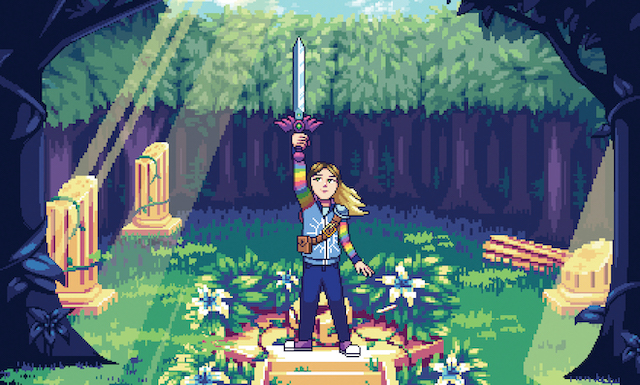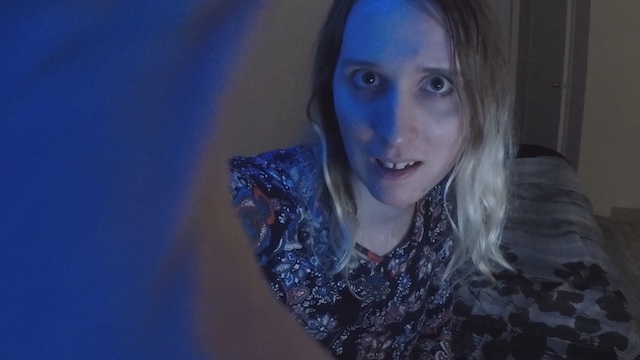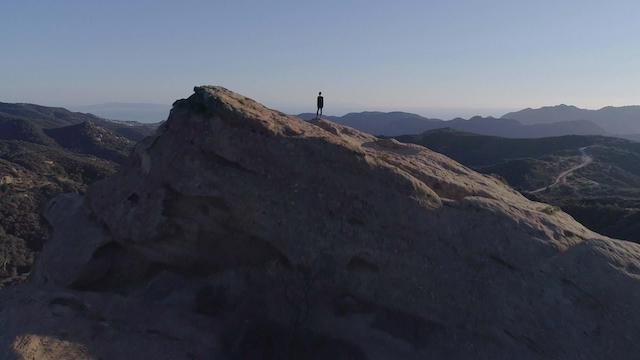
BY CHARLI BATERSBY | The documentary Break the Game begins with director/producer/co-editor Jane M. Wagner sorting through three thousand hours of footage of Narcissa Wright playing video games. When someone has three thousand hours of footage of themselves playing video games, and changes their name to “Narcissa,” and sleeps in front of a webcam with hundreds of viewers watching all night, there is a tale of obsession, tragedy, and glory to be found.
In 2015, Narcissa was a world-class “speedrunner,” which is gamer jargon for someone who can reach the end of a game very quickly. In the past, kids would watch their friends play a video game and ask, “Can I play now?”—but these days, watching other people play video games is almost as popular as actually playing yourself. Tens of thousands of viewers will log into the website Twitch, and watch as highly skilled gamers like Narcissa speedrun through Nintendo classics, sometimes taking only minutes to do what normally takes hours.
The personality of the player is just as important as the game they play. Live chats create a sense of community as viewers type to each other while watching someone play League of Legends, Grand Theft Auto, or, in Narcissa’s case, The Legend of Zelda.
Director Jane M. Wagner discovered Narcissa in what she calls, “A very Internetty way. I couldn’t beat a boss in a Nintendo 64 game… I went to YouTube to figure out how to beat the boss.”
She told us during our interview at the Tribeca Film Festival that, “I saw some of Narcissa’s videos, like her legendary Ocarina of Time runs. What really struck me was that I could tell that she was a celebrity of this subculture in video games. Instantly… I could tell that she had a special status.”
Back in 2015, live streaming while playing games was still a rising new form of media, and a new breed of celebrity. “I’d never really watched a video game live stream. It was unlike anything I’ve ever seen,” Wagner told us, “It felt very raw and emotional that she was giving her experience. It was a really tight community. It struck me as the future of where media was going. And the future of relationships.”

Narcissa was formerly known as “Cosmo” during the height of her popularity. When she came out as transgender in 2015, and began transitioning from male to female, her viewership plummeted from thousands to hundreds. She was openly trans for a month when Wagner discovered her, and the documentary focuses on Narcissa’s rapid fall from grace in the years during her public transition.
This all took place in the pre-Caitlyn Jenner days, which seem like a long time ago, but were a mere eight years in the past. It was an open secret in the gaming industry that many designers, fans, and journalists were transgender. But there was also a backlash to anything perceived as shoehorning politics into gaming.
One scene in the documentary shows Narcissa going to sleep while the Twitch camera is still on, and hundreds of people watch while she lies still through the night. Her audience continues chatting with each other, and one of them points out that she gets more viewers while sleeping than while gaming.
“Regardless of what she was doing, the chat was recording,” Wagner told us, “A form of performance art.”
Aside from archival footage of the Twitch feed, Break the Game also uses “in real life” footage of Narcissa away from her webcam and meeting people in the real world. This is mostly about Narcissa dating a person she met on Twitch, and the romantic relationship that flourishes. There is also original animation in the style of an early 1990s video game.
These are all edited together to form a narrative which follows the low points of its subject’s life when her Twitch stream declines. Then there is an attempt at redemption as Narcissa tries to reclaim her former glory by beating the newest Zelda game in record time.
At times, the footage is edited like a training montage from a Rocky movie; Narcissa practices a series of in-game techniques which will be used in The Big Game later on. And, when The Big Game comes, Narcissa successfully speedruns her way to a new record.
But her stream only gets a fraction of the views it did before she transitioned.
The story of her triumphant resurrection quickly turns into a chronicle of Narcissa’s mental instability, compulsive gaming, Internet addiction, gender dysphoria, cyberbullying, dwindling influener status, narcissism. They all collide and lead to acts of self-harm and self-sabotage and self-canceling, right in front of a live audience.

The film stops tracking Narcissa’s life in 2019, shortly after her first ban from Twitch. This generates a false sense that she has gotten out of the pro-streamer business. But her story only got more dramatic afterwards. Other documentaries about her (and the ample YouTube commentaries) show how she was reinstated to Twitch, then subsequently banned again multiple times, including one incident where she jokingly made a threat against Twitch.
Given that Break the Game is made from 3,000 hours of archival footage, but runs less than 75 minutes long, this seems like a conspicuous absence. The documentary abruptly ends just when the story is reaching its most dramatic part.
We asked Wagner why the film ends before the big controversies. “As a filmmaker I thought it had been covered. I am able to be very nuanced as a filmmaker,” she told us. “I was able to show Narcissa in all of her complexities in the film. As a real person with a lot of sides.”
Later she added, “There are so many people online who think they know her and make these horrible pieces.” Among those pieces is a three-hour documentary from 2021 about Narcissa’s subsequent bans from Twitch.
Wagner’s dedication to showing Narcissa as a multifaceted person, including the unique facet of her real life, is an admirable look at an obscure subculture. The film still feels like an incomplete story but, real life doesn’t have a decisive End Boss. Especially not when human lifespans last for decades, while Internet trends rarely outlive a Dramatic Chipmunk.
Runtime: 80 minutes. Director, Producer, Screenwriter: Jane M. Wagner. Cinematograper: Narcissa Wright, Justin Lee Stanley, Jane M. Wagner. Editor: Jane M. Wagner, Nina Sacharow, Stephanie Andreou. Composer: Jeffrey Brodsky, Jesse Novak. Co-Producer: Jonathon Norcross, Nina Sacharow, Stephanie Andreou. Consulting Producer: Carrie Weprin, Josh Penn, Matthew Brian Makar. Consulting Editor: Daniel Garber. Animation: Patrick Ackerman, Emily Wolver. To read the Jane M. Wagner-penned “Tribeca Recap and 5 Chances To See BREAK THE GAME,” click here. For information about upcoming festival screenings and other opportunities to see “Break the Game,” click here. On the calendar as of Chelsea Community News’ publication date of this piece: Screenings were scheduled for Thursday, August 3, 3:30pm at GENCON in Indianapolis and Saturday, August 12, 3pm at CinemaQ in Denver.
–END–
Chelsea Community News is an independent, hyperlocal news, arts, events, info, and opinion website made possible with the help of our awesome advertisers and the support of our readers. Our Promise: Never a paywall, no pop-up ads, all content is FREE. With that in mind, if circumstances allow, please consider taking part in our GoFundMe campaign (click here). To make a direct donation, give feedback, send a Letter to the Editor, or contact our founder/editor, email Scott Stiffler via scott@chelseacommunitynews.com.
To join our subscriber list, click here. It’s a free service providing regular (weekly, at least) Enewsletters containing links to recently published content. Subscribers also will be sent email with “Sponsored Content” in the subject line. That means it’s an exclusive message from one of our advertisers, whose support, like yours, allows us to offer all content free of charge.

You must be logged in to post a comment Login